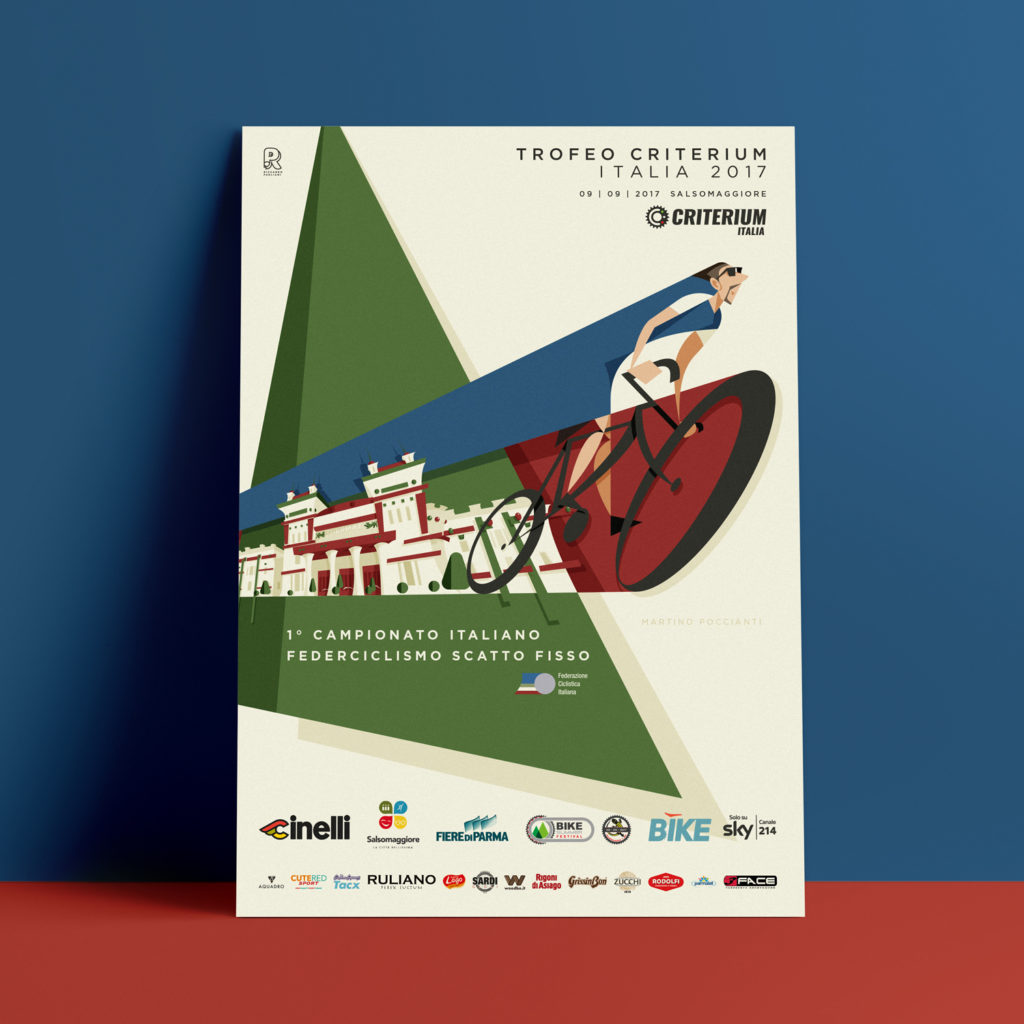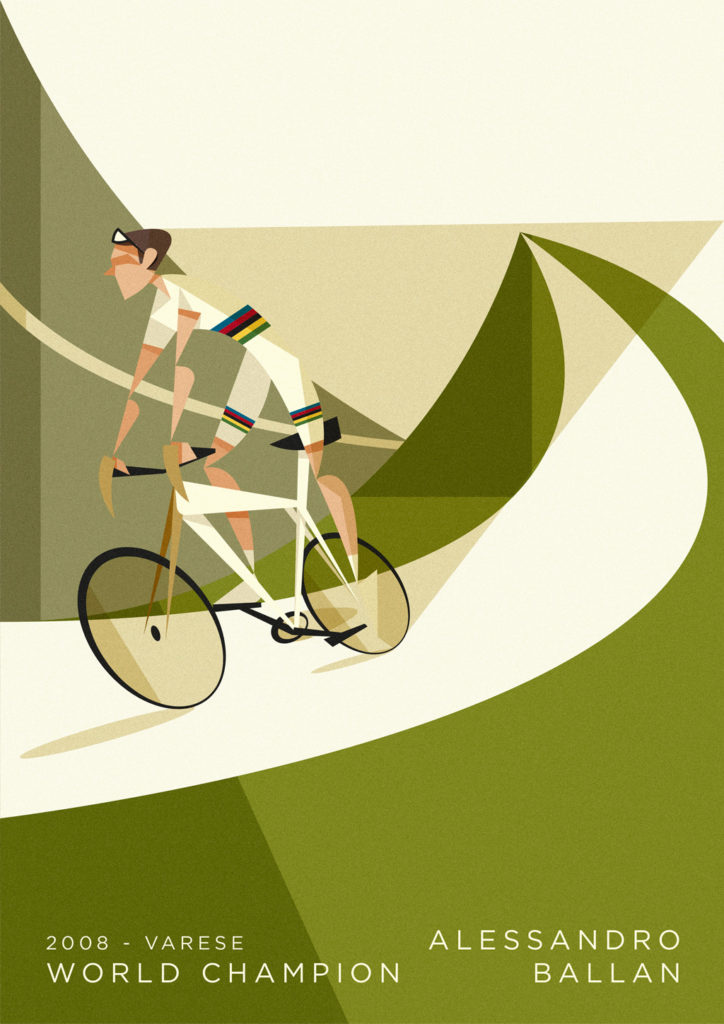Cycling is that striking moment when passion meets pain, which can culminate either in victory or folly. I discovered it thanks to some friends and the anecdotes they told me, but also thanks to the need to explore a sport that so many writers, musicians and poets wrote about. I’m going to describe what cycling is to me, through three people: Coppi, Mercks and the one and only Romeo Meo Venturelli.
THE PIRATE
I must admit that I’m not a cycling enthusiast. However, I’m a fan of athletes. I’ve always had great respect and envy for them and I wish I had their strength to overcome all the limits that the body usually imposes.
When my friends reminded me of the twelfth anniversary of the passing of The Pirate (as Pantani used to be called), I thought that paying him homage was a good idea.
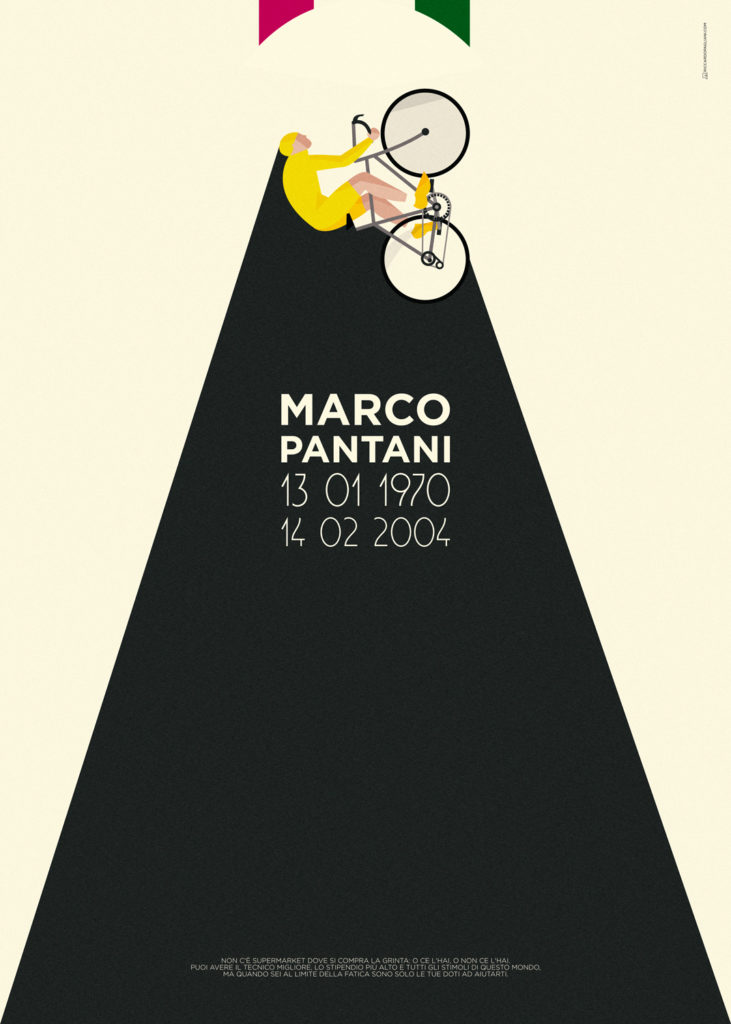
THE CANNIBAL
The discovery of Merckx, as well as the discovery of cycling, were just by chance. From that, sprang a great respect for the heroism associated to this discipline and for this great man. People who get on the pedals do that with the clear and inevitable intention of suffering, on the hairpin turns, on the hills, in the overtaking and in the falls.
The cannibal ate the extreme pain of others, a nourishment capable of always pushing him further. This allowed him to win everything, to become even almost boring for his determination and strength. A small tribute to his first Milan-San Remo, of 1966, one of the first bites left by the Belgian in the classic rides.
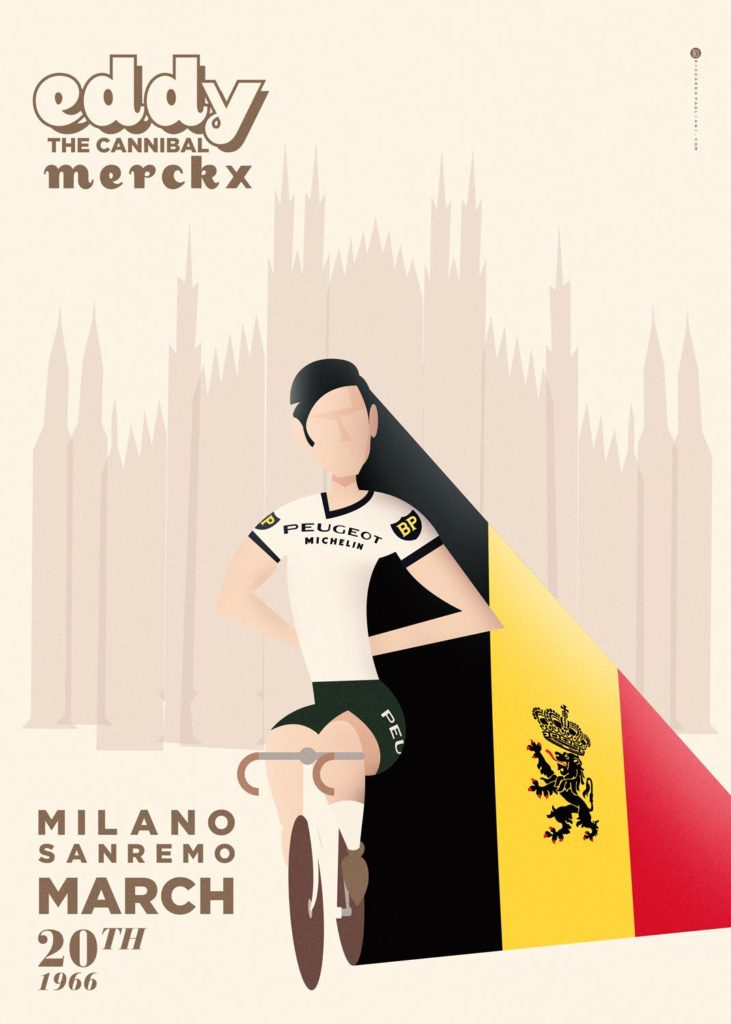
THE FOOL
Roland Barthes wrote that the entrance in the Epic for the cyclists takes place through the diminution of the name. It becomes lighter, indicating both a superhuman value and and a human intimacy.
Romeo, called “Meo”, Venturelli, was born in Sassostorno near Lama Mocogno, on December the 9th in 1938, in one of the few houses scattered along the valley, not far from the highway 12 of Abetone. Here one year and half later, the perfect Hero shows himself to the world. Under the rain and the hail Fausto Coppi flies along the hairpin turns towards Barigazzo, skims Meo and the houses of Sassostorno, then glids towards Modena. He’s going to win his first Pink Shirt, which he will be wearing until Milan.
At the end of 1959, Meo had become a real cyclist winning everything as an amateur and 23 races in the last year alone. The federation then suggests him to run in the Olympic games in Rome, delaying his transition to professionalism. Meo refuses, he signs with San Pellegrino, with Gino as sports director, Fausto as captain, and then him, the designated heir.
He’s the apprentice of Fausto, in order to learn both the art of cycling and of life. The gears to use, the diet to follow, the behaviors and daily precautions. To repay the trust, Meo shows to the great Champion his talent. Going downhill he gives him a sandwich, riding the bike only with one hand, going 60 kilometers per hour. In the plain he speeds up, lengthens his stride and leaves Fausto behind from the wheel. Uphill he’s a motorcycle. Merckx, ten years earlier.
Fausto is sure, “He’s a champion”, he’ll say. But Meo is crazy, he needs a guide in order to fulfill himself.
At the end of the year Meo drives Fausto home from a trip in Alto Volta. Coppi doesn’t know, but he got Malaria in Africa. On the 2nd of January 1960 Meo listens on the radio the news that will change his fate. Fausto Coppi, the Perfet Hero, dies. Meo will alternate a few remarkable feats and several, legendary falls. All or nothing.
Coppi’s doctor, Luigi Lincei, talking about Meo, is sure: “he might be the most complete racer of all time”. That “might” is crucial. One day, he sends him to train on the Porrettana railway, he needs to go back and forth. The doctor wants to check on him, so he gets in his car without being noticed. At some point he gets distracted, he can’t see the biker any more. He finds him in Marzabotto, the bike laying on the embankment. Meo is on the river Reno’s bank throwing some rocks in the water, he observes them, he listens to their sound. “What are you doing?” asks the doctor, “the loafer” Meo replies.
The first race of the season is the Paris – Nice, a race in stages. Meo stays at the end of the group, without struggling. But then he is told that the two french bikers are laughing at him, that they want to leave him behind. So, he overtakes the whole group, the French bikers as well and wins the Mountain Grand Prix. After that, there is the individual time trial, from Vergèze to Nimes, thirty-seven kilometers with hairpin bends and tracts in cobblestone. He gives half minute to Anquetil, a biker who will later win 5 Tour De France.
Tour of Italy, second stage. Sorrento-Sorrento, twenty-five kilometers of individual time trial. The narrow road is surrounded by old stone walls, it winds up on the steep slope of Faito Mountain and then it goes down with hairpin bends and tracts in cobblestone. On the top Meo has thirty-six seconds behind Anquetil. The french is already at the finish line, he’s called on the podium, he’s given the pink jersey. It seems to be over. But Meo bikes like crazy downhill, he even leaves the police on motorcycle bihind. And he wins, for 6 seconds, against Anquetil.
Pink jersey for him.
It’s a celebration, also in the small towns of Lama and Pavullo. And Meo wants to be part of it, he lets himself go. A few too many drinks, and oysters, it’s rumored. Some swear that they saw him partying with his friends that same night. Others even claim that he stayed up late with some ladies.
The day after there is the Sorrento-Campobasso stage, Meo immediately loses the jersey. Two more stages and he retreats. From then on, Meo racks up more defeats than wins, and many anecdotes, too many to tell.
At the Vignola circuit he is one lap ahead of the group, then he disappears. They start looking for him, he stopped under a plane tree in the shade.
During the Nice-Genoa, three bikers are breaking away from the group. Meo claims “if I want, I can reach them on my own”. He recovers the disadvantage in three minutes, he reaches them and then he stops, waiting for the group. “See? I reached them”. He turns his bike and goes back to the hotel.
Before a race he wants a slice of watermelon. He eats one, two, three or eight. Then he complains that he has stomachache. He forgets his shorts, his shoes, he runs with his mocassins.
During the Tre Valli Varesine he completes his masterpiece. He goes at the start but without his bike. No one wants to lend him one, so he must withdraw.
He likes fast cars, “that reach 200 kilometers per hour”, but he like women even more.
He’s in Milan, he is invited at the Rai studios (the Italian public television), he has to do a three minute advertisement for San Pellegrino live. He arrives at the studio; he waits for his moment and then he disappears. They look for him anywhere, and they find him in his dressing room with two women. They bring him back to the studio for the last two minutes of advertisement.
Never in bed before midnight, he said. During the Rome-Naples-Rome race he charms one of the girls who work on the Coke truck. He sets a date with her and she shows up, but with a friend. He invites them at the restaurant, and then in a hotel close to Termini Station. “Never had so much fun” he’ll say.
He’ll win only six races professionally, but what a fun. He’ll do his last run, the 2nd of April 2011, 8 years ago.
Bye Meo, thank you.
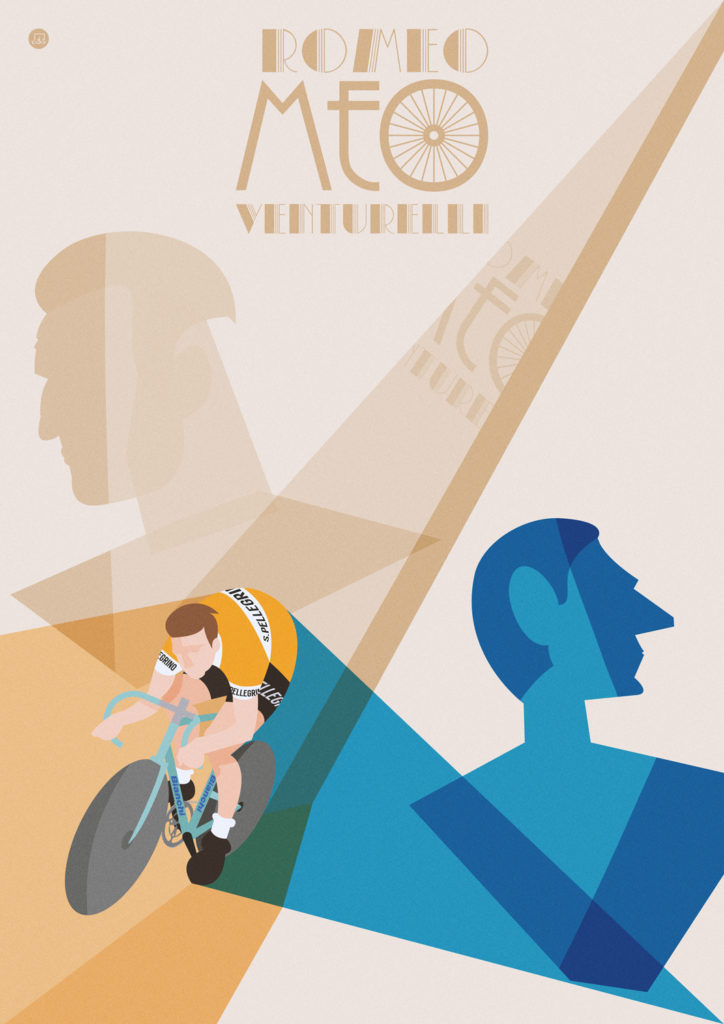
I will not dwell on the text, mainly because the last two posters I am going to show you are two commissions done for Criterium Italia and Nuova Corti. The first poster is the presentation of the Salsomaggiore race, the second one was a gift for the Italian World champion when he visited the shop years ago. But there will be more cycling again in the future 🙂
